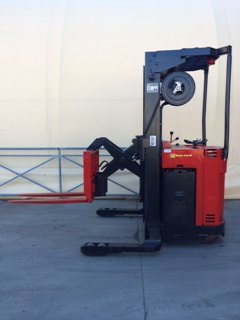Forklift Rentals & Purchase
There are certainly a few considerations to weigh up in the rent versus buy debate when it comes to any heavy equipment, including forklifts. In this article, we will take a look at a number of factors that can help you make a better-informed decision.
Perhaps the best place to start is to ask the following questions.
- How often will the forklift be needed? Will it work on a daily basis?
- How intense will the level of work be?
- Does the company have the necessary capital to buy a forklift?
- Will there be capital to cover any unexpected repairs and maintenance?
- How many forklifts do you need – just one or a fleet?
Let’s take a look at the advantages and disadvantages of each option.
Purchasing a forklift
The advantages of purchasing a forklift are:
- Purchasing a forklift for heavy use has a distinct advantage in costs over time.
- Superficial damage to the exterior of the forklift does not become a problem as you own it.
- Costs remain consistent (in terms of maintenance) and can be incorporated into budgets.
The disadvantages of purchasing a forklift are:
- A significant amount of capital is needed to purchase a machine.
- Your forklift will fall behind as technology improves.
- Older equipment may not continue to meet safety or emission standards.
Renting a forklift
The advantages of renting a forklift are:
- Lower costs, if the forklift is intended for short or medium term use.
- Your business does not need massive capital amounts to rent a forklift.
- All repairs are completed by the rental company, therefore no need for your own mechanics.
- The rental company will normally provide the latest in forklift technology.
The disadvantages of renting a forklift are:
- There is a waiting period for the equipment to arrive, unlike if you had your own forklift at a warehouse ready to use.
- It is difficult to determine how long a job can take, so often rental periods are either too long or too short and need to be adjusted.
- Your forklift operators may not be familiar with the rented model.
After looking at the pros and cons of each, perhaps these four points will help to make a better-informed decision.
Upfront costs
Renting a forklift does not have any massive upfront costs like purchasing one would. Of course, you have to factor in workload into the equation. If you are renting frequently, the costs will eventually be the same as that of a purchase.
Maintenance
Can you afford forklift maintenance? When renting, this becomes a priority for all forklift rental company. Of course, when renting, the equipment needs to be returned in the condition it was received. If you have a busy environment where dings, scratches or dents are inevitable, purchasing a forklift might be a better option, especially if you can afford it.
Safety
Always put safety and reliability above the cost of either renting or purchasing a forklift.
Flexibility
A rented forklift offers a company much more flexibility than a purchased unit. This is especially true if a forklift will be required for varied tasks. If so, the rental company can send you the appropriate machine for the task at hand.
At the end of the day, the rental versus buying debate is not a simple one, but ultimately, the pros and cons need to be weighed up and the right decision made.
Browse through the vast selection of forklifts that have recently been added to our inventory.
WHY CHOOSE US?
Whether or not you decide to rent a forklift for your business will ultimately depend on your company’s needs and circumstances. And whether you are leaning toward buying or renting, the professionals at Modern Forklift can help you come up with the best solution for your Toronto business.









 ©2025 Modern Forklift - All Rights Reserved
©2025 Modern Forklift - All Rights Reserved